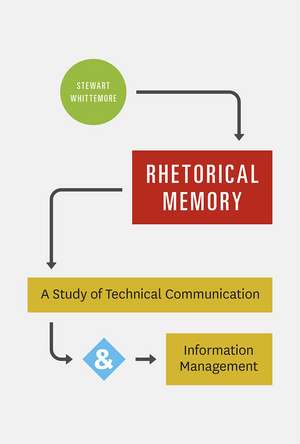Rhetorical Memory: A Study of Technical Communication and Information Management
Autor Stewart Whittemoreen Limba Engleză Hardback – 26 oct 2015
Institutions have regimes—policies that typically come from the top down and are meant to align the efforts of workers with the goals and mission of an institution. Institutions also have practices—day-to-day behaviors performed by individual workers attempting to interpret the institution’s missives. Taken as a whole, these form a company’s memory regime, and they have a significant effect on how employees analyze, mix, translate, sort, filter, and repurpose everyday information in order to meet the demands of their jobs, their customers, their colleagues, and themselves.
In Rhetorical Memory, Stewart Whittemore demonstrates that strategies we use to manage information—techniques often acquired through trial and error, rarely studied, and generally invisible to us—are as important to our success as the end products of our work. First, he situates information management within the larger field of rhetoric, showing that both are tied to purpose, audience, and situation. He then dives into an engaging and tightly focused workplace study, presenting three cases from a team of technical communicators making use of organizational memory during their everyday work. By examining which techniques succeed and which fail, Whittemore illuminates the challenges faced by technical communicators. He concludes with a number of practical strategies to better organize information, that will help employees, managers, and anyone else suffering from information overload.
In Rhetorical Memory, Stewart Whittemore demonstrates that strategies we use to manage information—techniques often acquired through trial and error, rarely studied, and generally invisible to us—are as important to our success as the end products of our work. First, he situates information management within the larger field of rhetoric, showing that both are tied to purpose, audience, and situation. He then dives into an engaging and tightly focused workplace study, presenting three cases from a team of technical communicators making use of organizational memory during their everyday work. By examining which techniques succeed and which fail, Whittemore illuminates the challenges faced by technical communicators. He concludes with a number of practical strategies to better organize information, that will help employees, managers, and anyone else suffering from information overload.
Preț: 292.97 lei
Preț vechi: 342.11 lei
-14% Nou
Puncte Express: 439
Preț estimativ în valută:
56.08€ • 60.93$ • 47.14£
56.08€ • 60.93$ • 47.14£
Carte indisponibilă temporar
Doresc să fiu notificat când acest titlu va fi disponibil:
Se trimite...
Preluare comenzi: 021 569.72.76
Specificații
ISBN-13: 9780226263380
ISBN-10: 022626338X
Pagini: 240
Ilustrații: 11 halftones, 8 line drawings, 1 table
Dimensiuni: 152 x 229 x 23 mm
Greutate: 0.5 kg
Ediția:1
Editura: University of Chicago Press
Colecția University of Chicago Press
ISBN-10: 022626338X
Pagini: 240
Ilustrații: 11 halftones, 8 line drawings, 1 table
Dimensiuni: 152 x 229 x 23 mm
Greutate: 0.5 kg
Ediția:1
Editura: University of Chicago Press
Colecția University of Chicago Press
Notă biografică
Stewart Whittemore is associate professor of English at Auburn University.
Cuprins
Acknowledgments
1. Managing Information in Organizations: An Overview of Ideas about Memory and Memory Work
2. Memory Work as Embodied Rhetorical Practice
3. Studying Rhetorical Memory Practices in Context
4. Learning Memory
5. Embodying Memory
6. Mastering Memory
7. The “New” Art of Memory
Appendix A
Appendix B
Notes
References
Index
1. Managing Information in Organizations: An Overview of Ideas about Memory and Memory Work
2. Memory Work as Embodied Rhetorical Practice
3. Studying Rhetorical Memory Practices in Context
4. Learning Memory
5. Embodying Memory
6. Mastering Memory
7. The “New” Art of Memory
Appendix A
Appendix B
Notes
References
Index
Recenzii
"An intriguing contribution to the field."
"This book will join a selective cadre of ethnographic scholars in technical communication who bring their fieldwork through a focused lens of theory—in this case the rhetorical arts of memory—that help us to understand how the modern workplace functions. His connecting of, for example, Aristotle’s concepts of techne and phronesis to Mary Carruther’s work on monastic memory craft and then on to Brown and Duguid’s work on contemporary knowledge management enterprises is impressive. He clearly goes beyond the surface use of these theoretical constructs by placing them deeply into his interpretations of individuals' memory practices in the modern workplace."
"Whittemore has written an engaging study of rhetorical memory practices that raises the profile of this neglected canon of rhetorical practice, and he does so by deftly drawing on literature in cognitive science, rhetorical theory, and technology studies. By doing so, Whittemore shows how memory is simultaneously an individual physiological act, a socially constructed act, and a technologically mediated act. Technical communication emerges from this mix both as a profession that is possible because of rhetorical memory but also as a profession that is responsible for assisting memory practices. The book's central case study at Software Unlimited nicely demonstrates this argument."
